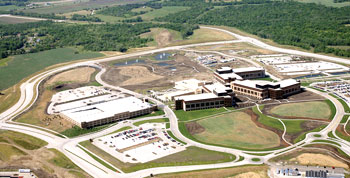UPPER MIDWEST REGIONAL REVIEW
|
Portage
and People |
|
|
| T |
urns out, the calloused hands of old- school tradespeople – tool- and- die makers, skilled metal workers, machinists – can bend metal into new- age wind turbines just as easily as they could turn out car parts. The demand for these hands is growing in the nation's Midwestern manufacturing core, as brand new industries seek the same kinds of skill sets that the industrial pioneers of the 19th and early 20th centuries found in great abundance around the shores of Lake Michigan and up the Mississippi River.
Call it infrastructure for the 21st Century. New age firms, whose products power our technology- driven society, are finding homes in the region formerly known as the rust belt. Siemens wants to build wind turbines in Iowa. Tower Tech, a manufacturer of wind towers for alternative energy, is expanding in Wisconsin. Alternative fuel production is huge in Iowa and in Minnesota, where advanced medical devices are invented and produced. In Michigan, a leading- edge research consortium of the world's top automakers is developing smart cars for future generations. And Google's going to Ann Arbor.
Efficient Transportation
Infrastructure Remains Key Criterion
 |
| When Wells Fargo chose consolidation over decentralization, Des Moines made perfect sense. |
The upper Midwest, which has lost thousands of manufacturing jobs to lower cost locations around the globe, seems to be getting back to basics, with a new focus on road building, rail modernization and port and airport expansion. And this new attention to a critical need is resonating with companies ranging from heavy manufacturers of construction materials to service industries.
In Michigan, for instance, where automotive industry job losses loom large as campaign issue No. 1 this fall, and where industrial vacancy rates top 35 percent in some submarkets, state officials have committed precious budget dollars to modernizing transportation infrastructure. Governor Jennifer Granholm's "Jobs Today, Jobs Tomorrow" initiative earmarks funds to complete ten years worth of infrastructure projects in three years, as part of a drive to attract new businesses and retain others.
In Iowa, an unusual local incentives package will finance the highway improvements Wells Fargo Home Mortgage needed to build a major headquarters campus in West Des Moines. While the company has long maintained a substantial presence in the Des Moines metropolitan area, senior vice president Cheryl Howard says that the firm considered downsizing in Des Moines and relocating some divisions to other parts of the country, where Wells Fargo had started other facilities construction projects.
"We did think about moving these functions to other facilities that were under construction elsewhere, but instead, we made a strategic decision to consolidate here in Des Moines," she explains. "From a training and talent cultivation perspective, it made sense to keep all job functions here."
A pristine greenfields location in rapidly developing West Des Moines piqued the interest of the site selection team. Only one problem: Lack of highway access meant a difficult commute for the 4,500 employees who eventually would work at the facility.
The issue could have been a deal stopper, Howard says. But in a surprise move, the local authorities stepped up to the plate, offering to construct an extension to Jordan Creek Parkway that would bring the road out to the new campus. Authorities also agreed to build several highway interchanges.
"West Des Moines is not known for its incentives – they rarely, if ever, provide incentives. But in this case, they did the bonds for the road infrastructure we had to have," Howard says. "Although the locality had already planned to extend the roadway to accommodate increased development in the area, Wells Fargo's interest in the site expedited this capital improvement project.
"The willingness of West Des Moines to do these road infrastructure improvements was critical to our decision- making process," Howard continues. "And ultimately, it will pay back big dividends for the entire community, since new residents of the area will use the road as well."
Designers of the new corporate campus employed significant elements of sustainable design and environmental responsibility in the construction of the complex, a series of four buildings surrounded by landscaped walkways, ponds and drought- resistant native plantings. The facilities – at once strikingly futuristic yet nicely suited to their pastoral surroundings – cover 175 acres (71 hectares) of former farmland.
In addition to the road improvements, the company received US$10 million in financial incentives from the Iowa Values Fund. Wells Fargo Home Mortgage is splitting the incentives package with Wells Fargo Financial, which is building a nine- story office tower in downtown Des Moines.

